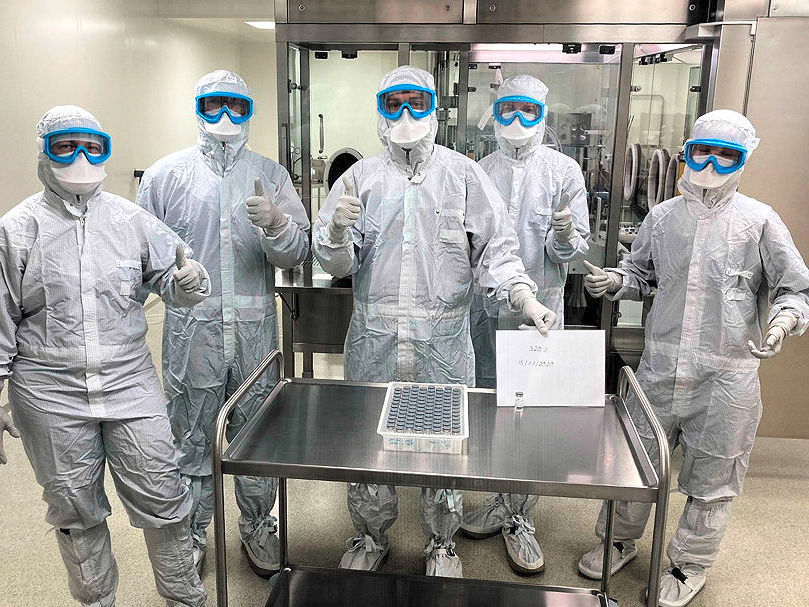Human antibody against COVID-19 ready for clinical trials
Antibody blocks the cell entry of SARS-CoV-2 and thus prevents the proliferation of corona viruses
CORAT Therapeutics CEO Dr. Andreas Herrmann announced the completion of the production campaign of the first major batch of COR-101, which is now available for clinical trials. COR-101 is a fully human antibody developed in Braunschweig, Germany, which efficiently blocks the cell entry of SARS-CoV-2 and thus prevents the proliferation of corona viruses. As COR-101 attacks the virus directly, its first clinical application will focus on helping already infected patients, as this is the most urgent medical need in the pandemic. However, it is expected that COR-101 will also protect the non-infected - this will be tested in a second step.

Fraunhofer ITEM staff have completed the filling of the first major GMP production campaign of COR-101, an experimental therapeutic agent against COVID-19. It was produced with an innovative cell pool technology that enabled much faster production
Fraunhofer ITEM, Prof. Holger Ziehr
Human antibodies are molecules that our own body produces to fight infections. COR-101 is one of these antibodies. CORAT Therapeutics produces it in large quantities using biotechnological methods. By directly neutralising the corona viruses, it is also intended to help patients who cannot produce their own antibodies in time.
Dr. Andreas Herrmann adds: "We are extremely happy and would like to thank everyone who has contributed to making this happen so quickly. In view of the rapidly increasing number of acute cases, CORAT wants to create a possibility for direct treatment of COVID-19 patients in order to help all those who are already infected or for whom the vaccination does not work. We hope that the clinical trials can now start very soon".
The production process was based on stable expressing CHO cell pools. This new path of bioprocess development was taken for the first time and allowed the manufacturing of the clinical test material in a much shorter time than with conventional antibody production methods. Prof. Holger Ziehr, Head of the Pharmaceutical Biotechnology Division at the Fraunhofer ITEM in Braunschweig, who is in charge of the production of the clinical antibody, comments: "Thanks to the excellent cooperation between all partners and the regulatory authorities, we were able to develop a novel and innovative production process that saved many months. What we have learned here will certainly also inspire more efficient drug development in the future".
The start of clinical trials with COR-101 is planned for early next year.
Other news from the department research and development
Most read news
More news from our other portals
Something is happening in the life science industry ...
This is what true pioneering spirit looks like: Plenty of innovative start-ups are bringing fresh ideas, lifeblood and entrepreneurial spirit to change tomorrow's world for the better. Immerse yourself in the world of these young companies and take the opportunity to get in touch with the founders.
See the theme worlds for related content
Topic world Antibodies
Antibodies are specialized molecules of our immune system that can specifically recognize and neutralize pathogens or foreign substances. Antibody research in biotech and pharma has recognized this natural defense potential and is working intensively to make it therapeutically useful. From monoclonal antibodies used against cancer or autoimmune diseases to antibody-drug conjugates that specifically transport drugs to disease cells - the possibilities are enormous

Topic world Antibodies
Antibodies are specialized molecules of our immune system that can specifically recognize and neutralize pathogens or foreign substances. Antibody research in biotech and pharma has recognized this natural defense potential and is working intensively to make it therapeutically useful. From monoclonal antibodies used against cancer or autoimmune diseases to antibody-drug conjugates that specifically transport drugs to disease cells - the possibilities are enormous





















































